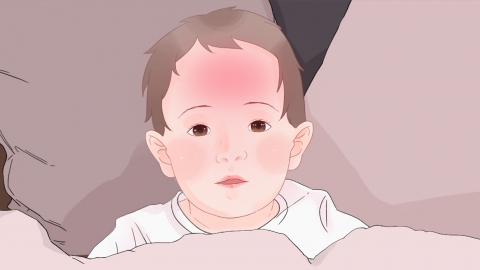What to do if a baby has a fever of 38°C
Generally, a baby's fever of 38°C may be caused by an immature immune system, high environmental temperature, upper respiratory tract infection, infantile emergency rash, intestinal infection, or other reasons. It is recommended to seek timely medical attention, identify the underlying cause, and then improve the condition through general treatments, medications, and other methods under a doctor's guidance. The detailed analysis is as follows:

1. Immature immune system: A baby's immune system is not yet fully developed and their resistance is weak, making them prone to fever from external stimuli, usually low-grade fever. Keep the indoor air well-circulated, maintain a room temperature of 22-24°C, dress the baby in loose clothing to aid heat dissipation, encourage drinking warm water to stay hydrated, use warm water to wipe the neck and armpits for cooling, and closely monitor body temperature changes.
2. High environmental temperature: Stuffy indoor conditions and overdressing can cause a baby's temperature to rise, resulting in fever accompanied by sweating and irritability. Promptly reduce clothing, adjust the indoor temperature, avoid direct sunlight, and allow the baby to rest in a cool environment. Body temperature can usually return to normal gradually without specific medication.
3. Upper respiratory tract infection: Viral or bacterial infections causing colds may lead to fever, accompanied by nasal congestion and runny nose. Patients should use medications such as pediatric paracetamol and chlorpheniramine granules, Pudi Lan anti-inflammatory oral liquid, and pediatric cold care syrup as directed by a physician. Physical cooling should be prioritized for low-grade fever.
4. Infantile emergency rash: Initial symptoms of this infection caused by human herpesvirus include fever, followed by a rash appearing after 3-4 days. During the fever, ensure the baby drinks plenty of water and consumes light, easily digestible food. When the temperature exceeds 38.5°C, use medications such as paracetamol suspension drops, ibuprofen suspension, or pediatric Chai Gui antipyretic granules as directed by a physician. After the rash appears, keep the skin clean and avoid scratching.
5. Intestinal infection: Bacterial or viral infections of the intestines can cause fever, accompanied by diarrhea and vomiting. Patients should use medications such as montmorillonite powder, Bifidobacterium triple live capsules, and oral rehydration salts III as directed by a physician to prevent dehydration and electrolyte imbalance.
Daily attention should be given to the baby's personal hygiene, including frequent handwashing and avoiding contact with sick individuals. Adjust clothing according to weather changes, arrange a balanced diet, enhance resistance, and provide scientific care to help alleviate the baby's fever symptoms and promote recovery.




